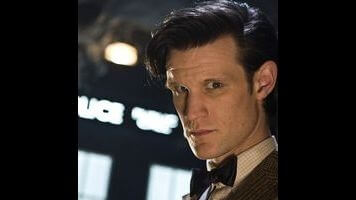Doctor Who: “A Town Called Mercy”

Last week I wrote that this season’s third episode looked like it owed a debt to the Michael Crichton movie Westworld. But I spoke too soon. “A Town Called Mercy,” written by Being Human creator (and Who veteran) Toby Whithouse, nods to that movie with its cyborg gunslinger, but it nods in other directions as well: toward The Terminator, and Battlestar Galactica and, in its framing device, toward The Road Warrior. (And, probably accidentally, a bit toward Cowboys And Aliens, too.) But those allusions are mostly decorative. “A Town Called Mercy” owes its greatest debt to the strain of Westerns that can be traced back at least to The Ox-Bow Incident, stories in which cowboys and other frontiersman do battle more with moral dilemmas than outlaws or other threats.
It doesn’t seem like it’s going to turn into that at first, though. In fact, the opening scenes of the episode feint in other directions, making it seem as of The Doctor and the Ponds will be called upon simply to protect an innocent town and its alien benefactor from a pitiless killing machine known as The Gunslinger (Andrew Brooke). The set-up’s quite fun, too. The Doctor arrives in town, pieces together that something’s not quite right from the slightly-ahead-of-its-time technology, and sniffs out the source: another alien doctor. He’s not a Time Lord, though, he’s a meek-seeming fellow named Kahler-Jex (Adrian Scarborough). Yet throughout the episode he’ll hold a mirror up to The Doctor’s soul.
That pitiless killing machine isn’t so pitiless after all, at least when it comes to matters other than slaying those who wronged him, Kahler-Jex first among them. He’s a victim of desperate wartime medical experiments, and now that the war is over he’s come to exact revenge. All that stands between him is the town, and in particular a sensible, upright marshall (Ben Browder of Farscape) who does double duty as the town’s conscience. Reasoning “America’s a land of second chances,” he feels it's his duty to shelter Kahler-Jex from vengeance. He’s been nothing but kind and helpful to the town, after all. But the marshall’s death leaves the town without a conscience, and when The Doctor steps into the role, he discovers his usually unflappable sense of right and wrong challenged by the situation at hand.
In its basic form, the classic Western is about life in the 19th century American West, sure, but at heart it’s really about the never-ending struggle between order and chaos. Will the values of the town—the values of American civilization—win out or will the lawlessness of the frontier prevail? Artists started complicating and challenging that classic form pretty much from the moment it began, of course, and “A Town Called Mercy” is no exception. Who’s right here? It’s tough to side with a cold assassin, but the Gunslinger has his reasons. (And, we find out, he’s not really that cold.) Yet Kahler-Jex is a war criminal. War may be, as he reasons, another world, but that doesn’t really change what he did in that world. So what should win out: Lawless revenge or civilized justice?
 Keep scrolling for more great stories.
Keep scrolling for more great stories.
